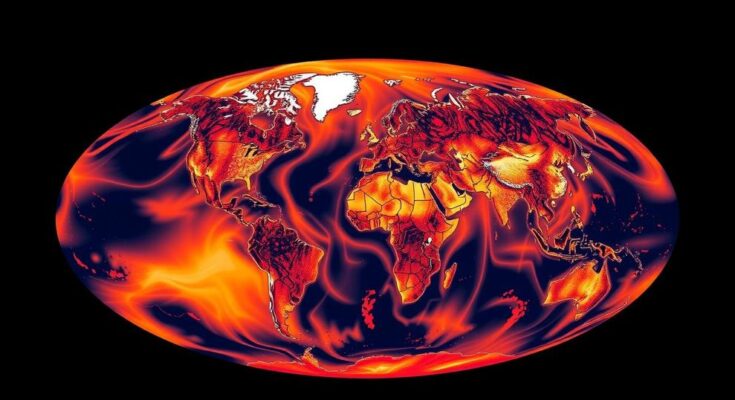The World Meteorological Organization warns that greenhouse gas levels reached record highs in 2023, with carbon dioxide at 420 ppm, a concentration not seen in millions of years. These levels lock in future temperature increases regardless of any emissions cuts. The rise is fueled by natural climate events and human activities, leading to a feedback loop of worsening climate impact. The need for urgent global action is emphasized as the Cop29 climate summit approaches.
In 2023, unprecedented levels of greenhouse gases have been detected in the Earth’s atmosphere, according to a warning from the World Meteorological Organization (WMO). The report, released in anticipation of the upcoming Cop29 climate summit in Azerbaijan, indicates that the atmospheric concentration of carbon dioxide has surged to 420 parts per million (ppm), a level not reached in three to five million years, which was associated with a global temperature increase of 3 degrees Celsius and significantly higher sea levels. WMO Secretary-General Celeste Saulo remarked, “Another year. Another record. This should set alarm bells ringing among decision makers. We are clearly off track to meet the Paris Agreement goal of limiting global warming to well below 2C.” The atmospheric CO2 levels have now surged by 151 percent compared to pre-industrial times, with the past year witnessing a 2.3 ppm increase, marking the twelfth consecutive year of rises above the 2 ppm threshold. Factors such as the El Nino phenomenon, persistent greenhouse gas emissions from fossil fuels, and extensive vegetation fires have collectively contributed to this dramatic rise in CO2. The report underscores a critical shift wherein natural carbon sinks, such as forests and oceans, are becoming less effective at absorbing CO2, establishing a feedback loop that exacerbates climate change. WMO Deputy Secretary-General Ko Barrett noted, “Climate change itself could cause ecosystems to become larger sources of greenhouse gases.” Notably, global fire carbon emissions in 2023 surpassed the average by 16 percent due to historic wildfire seasons in Canada and Australia experiencing record drought conditions that fueled severe bushfires. Additionally, methane has risen to 1,934 parts per billion—265 percent higher than pre-industrial levels—while nitrous oxide levels reached 336.9 parts per billion, marking a 125 percent increase from earlier benchmarks. The WMO report reveals that approximately half of carbon dioxide emissions persist in the atmosphere; meanwhile, oceans absorb roughly one quarter, with nearly 30 percent being absorbed by land ecosystems. However, these absorption rates fluctuate based on climatic events such as El Nino and La Nina. The long-term implications of elevated greenhouse gas levels are profound. According to the US National Oceanic and Atmospheric Administration, greenhouse gases are causing warming that is 51.5 percent more intense than in 1990; CO2 is responsible for about 80 percent of this escalation. The permanence of CO2 in the atmosphere necessitates immediate action, as the impact of every increment in concentration and temperature exacerbates environmental challenges, as emphasized by Celeste Saulo: “Every part per million and every fraction of a degree temperature increase has a real impact on our lives and our planet.” The WMO’s findings stress the urgency for a coordinated global response as discussions advance at Cop29 in Baku.
The WMO’s report highlights alarming trends in greenhouse gas concentrations that have reached unprecedented levels in 2023. These elevated levels are anticipated to impact global climate and contribute to rising temperatures for decades. Natural factors such as the El Nino climate pattern, wildfires, and declining efficacy of natural carbon sinks like forests and oceans have exacerbated this situation.
The essential findings of the WMO report underscore the critical state of greenhouse gas levels and their far-reaching consequences. The record levels of carbon dioxide and methane point to an urgent need for action to mitigate climate change and to adhere to international agreements aiming to limit global warming. As the climate summit approaches, the emphasis on immediate policy changes and global cooperation becomes increasingly crucial in addressing climate change’s severe implications.
Original Source: www.rfi.fr




